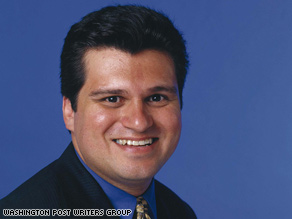Commentary: What Mexico's drug war means for U.S.
- Story Highlights
- Ruben Navarrette: Mexico's drug war is serious, but it's not a "failed state"
- He says the United States has a lot at stake in the outcome of the fight
- Navarrette: Mexico's president is smart and brave and knows he can't surrender
- The country has a big population, free press and bold leaders, he says
- Next Article in Politics »
Special to CNN
Ruben Navarrette Jr. is a nationally syndicated columnist and a member of the editorial board of the San Diego Union-Tribune. Read his column here

Ruben Navarrette says Mexico isn't a failed state, but the fate of its drug war is important for US.
SAN DIEGO, California (CNN) -- You may have heard the rumor that, as a result of a bloody drug war that has claimed more than 7,000 lives since January 2007, Mexico is on the verge of being declared a "failed state."
Drawing a lot of its oxygen from cable demagogues and talk radio, the chatter intensified several weeks ago when the Pentagon issued a report warning that our neighbor -- along with Pakistan, no less -- could face a "rapid and sudden" collapse because "the government, its politicians, police and judicial infrastructure are all under sustained assault and pressure by criminal gangs and drug cartels."
How's this for pressure? The police chief in Ciudad Juarez resigned last week after drug traffickers began to make good on their promise to kill police officers in that city until the chief stepped down.
The Mexican drug war is the real deal, and so is the threat to both Mexico and the United States. The casualties are mounting. The killings are becoming more brutal, and now include the beheading of soldiers.
The cartels are essentially terrorizing the Mexican people in the hopes of convincing them to put pressure on the government to relent in its efforts to put the bad guys out of business.
Take it from someone who has known Mexican President Felipe Calderon since before he took the job -- back when we were in graduate school together nearly a decade ago -- that's not going to happen.
Don't Miss
Calderon was brave enough to take on the drug cartels by arresting their leaders, confiscating their product, and -- most importantly -- seizing the large shipments of cash that they need to operate. And he's smart enough to know that letting up on the pressure before the task is done would only make matters worse and basically hand Mexico over to the drug lords
Meanwhile, there is no question that Americans will pay a price if the drug violence spills over the border. Just a few days ago, the U.S. State Department issued a blunt travel advisory warning Americans with plans to travel in Mexico to be extra careful.
"Recent Mexican army and police confrontations with drug cartels have resembled small-unit combat, with cartels employing automatic weapons and grenades," the advisory reads. "Large firefights have taken place in towns and cities ... and during some of these incidents, U.S. citizens have been trapped and temporarily prevented from leaving the area."
Firefights will put a crimp in the tourist industry. But, Mexicans are quick to point out the irony. Here Americans are worried about their safety in Mexico when one of the reasons the Mexican government is having such a difficult time fighting the drug cartels is because the enemy has plenty of money and guns. And both are coming from the north.
According to most estimates, about 90 percent of all the cocaine flowing into the United States comes from Mexico and about 90 percent of the guns seized in drug-related violence come from the United States.
Former President George W. Bush and Congress deserve credit for pushing through $400 million in emergency aid in the Merida Initiative to help the Mexican government fight the cartels.
And even though Mexico is still waiting for delivery of most of those funds, there were signals this week that the Obama administration understands the stakes involved.
Homeland Security Secretary Janet Napolitano announced new measures to prevent the violence from spreading to this side of the border and told Congress that the issue demands the "utmost attention." Attorney General Eric Holder called the drug cartels a "national security threat" to the United States and said Americans "simply can't afford to let down our guard."
Even so, this business about Mexico on its way to being a "failed state" is just a lot of hot air. The rumors of our neighbor's demise have been greatly exaggerated.
A country of 110 million people, Mexico is still a functioning democracy with press freedoms and bold leaders, like Calderon, who are tackling the issue of drug violence head on. There is plenty of reason for optimism.
Frankly, one reason the doomsday talk about Mexico catches on is because it distracts Americans from our own problems. I learned a long time ago that, for many of my countrymen, Mexico serves a purpose in tough times by providing something to which we can feel superior.
Even with the banking bailouts, mortgage crisis, a plummeting stock market and rising unemployment, the thinking goes, we can at least be grateful that we're not Mexico.
For Mexican-Americans like me, that's cold comfort. I expect a lot more of my country -- the United States -- than I do the country that my grandfather left behind a hundred years ago when he legally immigrated north.
And right now, what I expect is for all Americans to realize -- and for the Obama administration to never forget -- that it's impossible to feel safe when there is a wildfire in the neighborhood.
The opinions expressed in this commentary are solely those of Ruben Navarrette.
All About Mexico • Felipe Calderon • Janet Napolitano

 Sit tight, we're getting to the good stuff
Sit tight, we're getting to the good stuff